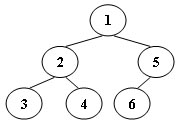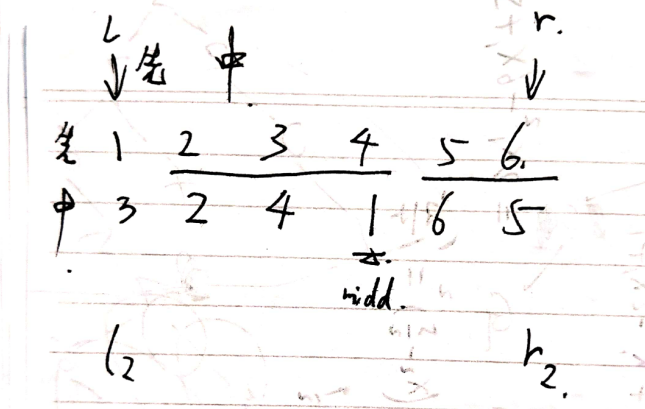An inorder binary tree traversal can be implemented in a non-recursive way with a stack. For example, suppose that when a 6-node binary tree (with the keys numbered from 1 to 6) is traversed, the stack operations are: push(1); push(2); push(3); pop(); pop(); push(4); pop(); pop(); push(5); push(6); pop(); pop(). Then a unique binary tree (shown in Figure 1) can be generated from this sequence of operations. Your task is to give the postorder traversal sequence of this tree.

Figure 1
Input Specification:
Each input file contains one test case. For each case, the first line contains a positive integer N (≤) which is the total number of nodes in a tree (and hence the nodes are numbered from 1 to N). Then 2 lines follow, each describes a stack operation in the format: "Push X" where X is the index of the node being pushed onto the stack; or "Pop" meaning to pop one node from the stack.
Output Specification:
For each test case, print the postorder traversal sequence of the corresponding tree in one line. A solution is guaranteed to exist. All the numbers must be separated by exactly one space, and there must be no extra space at the end of the line.
Sample Input:
6
Push 1
Push 2
Push 3
Pop
Pop
Push 4
Pop
Pop
Push 5
Push 6
Pop
Pop
Sample Output:
3 4 2 6 5 1题意,根据先序和中序,推出后序
思路:递归

#include <stdio.h> #include <stack> int first[50]; int mid[50]; int n; int find_mid(int x) { int i; for(i=0; i<n; i++) { if(mid[i]==x) return i; } } int count_=0; void print(int l, int r, int l2, int r2) //后序 { //printf("%d %d\n",l,r); if(l==r){ ++count_; printf("%d",first[l]); if(count_==n) printf("\n"); else printf(" "); return ; } if(l>r) return ; int midd=find_mid(first[l]); //left print(l+1, l+midd-l2, l2, midd-1); //right print(l+midd-l2+1, r, midd+1, r2); //mid ++count_; printf("%d", first[l]); if(count_==n) printf("\n"); else printf(" "); } int main() { int i,j=-1,k=-1; char P[100][6]; std::stack <int> st; scanf("%d", &n); getchar(); for(i=0; i<2*n; i++) { scanf("%s", &P[i]); if(P[i][1]=='u') { scanf("%d", &first[++j]); getchar(); st.push(first[j]); } else {//pop getchar(); mid[++k]=st.top(); st.pop(); } } print(0,n-1,0,n-1); return 0; }